SiteGround Review As Good As They Say?
Tooltester is supported by readers like yourself. We may earn an affiliate commission when you purchase through our links, which enables us to offer our research for free.
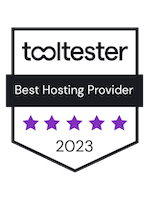 We named SiteGround our Best Hosting Provider for 2023!
We named SiteGround our Best Hosting Provider for 2023!
Find out why in this complete review of SiteGround's product.
SiteGround is a Bulgarian company launched in 2004 by university students. Since then, it has grown steadily, and is now home to over 500 employees and nearly 3 million domains.
The tech support team is available 24/7 every day of the year. According to their website, they also seem to highly value loading speed.
There is a lot to process, and SiteGround promises tons of benefits. But is it all true?
After having tested SiteGround Shared hosting solution on our test site, I decided to write this SiteGround review, which I hope will help you decide whether it's the best option for your website.
But if you don't have time to read this SiteGround review, just watch this short video I put together for you:
Screenshots
SiteGround Pricing & Hosting Plans
StartUp
For 1 website, unlimited traffic and 10 GB of storage. Only automatic backups. First term: $2.99GrowBig
For unlimited websites and traffic and 20 GB of storage. Manual and automatic backups. First term: $4.99GoGeek
For unlimited websites and traffic and 40 GB of storage. Manual and automatic backups. First term: $7.99The following SiteGround prices are for their shared hosting plans, which is the most popular service. SiteGround offers additional web hosting options (e.g. cloud hosting plans), you can see their costs here.
| SiteGround Features | StartUp | GrowBig | GoGeek |
|---|---|---|---|
| Websites hosted | 1 site | Unlimited websites | Unlimited websites |
| Monthly visitors | Unlimited (recommended maximum: 10k) | Unlimited (recommended maximum: 100k) | Unlimited (recommended maximum: 400k) |
| SSL certificate | Yes | Yes | Yes |
| Support | Phone, email and live chat | Phone, email and live chat | Phone, email and live chat (Priority support) |
| Priority support team | No | No | Yes |
| Storage | 10 GB | 20 GB | 40 GB |
| Inodes | 200,000 | 400,000 | 600,000 |
| Database | Unlimited number
Max. size 1 GB |
Unlimited number
Max. size 1 GB |
Unlimited number
Max. size 1 GB |
| Subdomains, FTP accounts, email accounts and bandwidth | Unlimited | Unlimited | Unlimited |
| Free domain included | No | No | No |
| Daily backups, Caching & Staging | 30 days, static & dynamic caching | 30 days, static & dynamic caching | 30 days, static & dynamic caching |
| CDN (Content Delivery Network) | Free version included | Free version included | Free version included |
| First term price | $2.99/month | $4.99/month | $7.99/month |
| Renewal price | $17.99/month | $29.99/month | $44.99/month |
| More information | siteground.com | ||
What can you expect from each SiteGround web hosting plan?
This hosting company offers 3 shared hosting plans, which, in most cases, adjust to the needs of most users – unless you have a really big website. Note that all the plans share the following features:
- They do not limit the traffic that your website can receive. But of course, if you have a lot of monthly visitors (e.g. over 400,000), the shared hosting might fall short
- Databases and unlimited email accounts
- 30-day money-back guarantee
- SSD disks and it’s own caching system
- 24-hour phone, chat and email support
But, of course, not all SiteGround plans are equal. Below, we’ll take a look at their main differences.
StartUp: Ideal for users that have a single small-to-medium-sized website and need less than 10 GB of space. In this plan you’ll have the cache service, but not access to Ultrafast PHP. Advanced features (e.g. staging) aren’t part of this package either.
GrowBig: This plan was created to store unlimited sites and 20 GB of space. You’ll have access to the staging tool, and their (smart) on-demand backups system. This plan makes it possible to use Ultrafast PHP. You can host unlimited websites with this plan.
GoGeek: In addition to offering you more space (40 GB) and allow you to host unlimited sites, it comes with better-performing servers and pre-installed Git repositories. It also comes with support for white-label SiteGround hosting, something agencies will appreciate. You will have priority support with this plan.
SiteGround Pros & Cons
- Pros
- Cons
Pros
-
Excellent uptime
This hosting company has some of the best availability figures around (nearly 100%). We’ll cover this more below.
-
High-speed web hosting
Because of the hardware they use (e.g. SSD disks) and the software solution (e.g. SG Optimizer and HTTP/2), SiteGround servers offer above-average speeds.
-
Easy and intuitive to use
Your system is easy to use, and the features are perfectly integrated between them.
-
Excellent customer service
SiteGround offers a very complete level of customer support Its tutorials and guides are also high quality.
-
Server location
When you open your account with this hosting company, you can choose between servers in America, Asia, Australia and Europe.
-
Advanced features
SiteGround incorporates features that most web hosts don’t have. For example, staging, own caching or Git repositories. Or free integrations with Cloudflare or Let’sEnrcypt (for a free SSL certificate).
-
Collaborators
With SiteGround you’ll be able to create additional users with access to the different websites you manage.
-
Unlimited traffic
They don’t measure your website’s traffic.
When to use SiteGround hosting?
SiteGround offers unbeatable services and I’d recommend it in a heartbeat. It’s suitable for serious projects, and if you need more performance down the line, you can upgrade to one of its premium hosting plans (e.g. cloud hosting or dedicated). I especially recommend it for:
- Online store (SiteGround WooCommerce hosting available)
- Professional bloggers
- Websites that run on WordPress (more information) – to have managed WordPress hosting services.
- Large corporate websites
- Developers and designers that want quality and good customer support
- Those looking for features like staging, Git repositories or SSH access
- In general, anything that will require high-performance solutions
Remember that you can try SiteGround for 30 days with no obligation.
When not to use SiteGround hosting?
Even though this hosting company adapts to many profiles, in some cases it might not be the best option, for example:
- If you’re looking for cheap web hosting
- If you want Windows-based servers (check InMotion Hosting or A2 Hosting)
- If you need a lot of webspace and have a small budget
SiteGround specifications
What does SiteGround’s backend look like?
At the beginning of 2020 SiteGround moved away from its old (but good) cPanel to a more modern approach. I have to say that I really like the new system, it looks much nicer than cPanel and it’s intuitive to use.
As a heavy cPanel user, I thought I’d miss it, but I have to say that it only took me a couple of hours to familiarize myself with the new SiteGround panel.
Besides the new design, my favorite dashboard (they call it Site Tools) enhancement is that now websites are treated (managed) individually. This means that each site will have their own separate admin panel, which makes things easier if you have a couple of projects hosted on SiteGround (e.g. you can back up 1 site as opposed to having to back up the whole account).
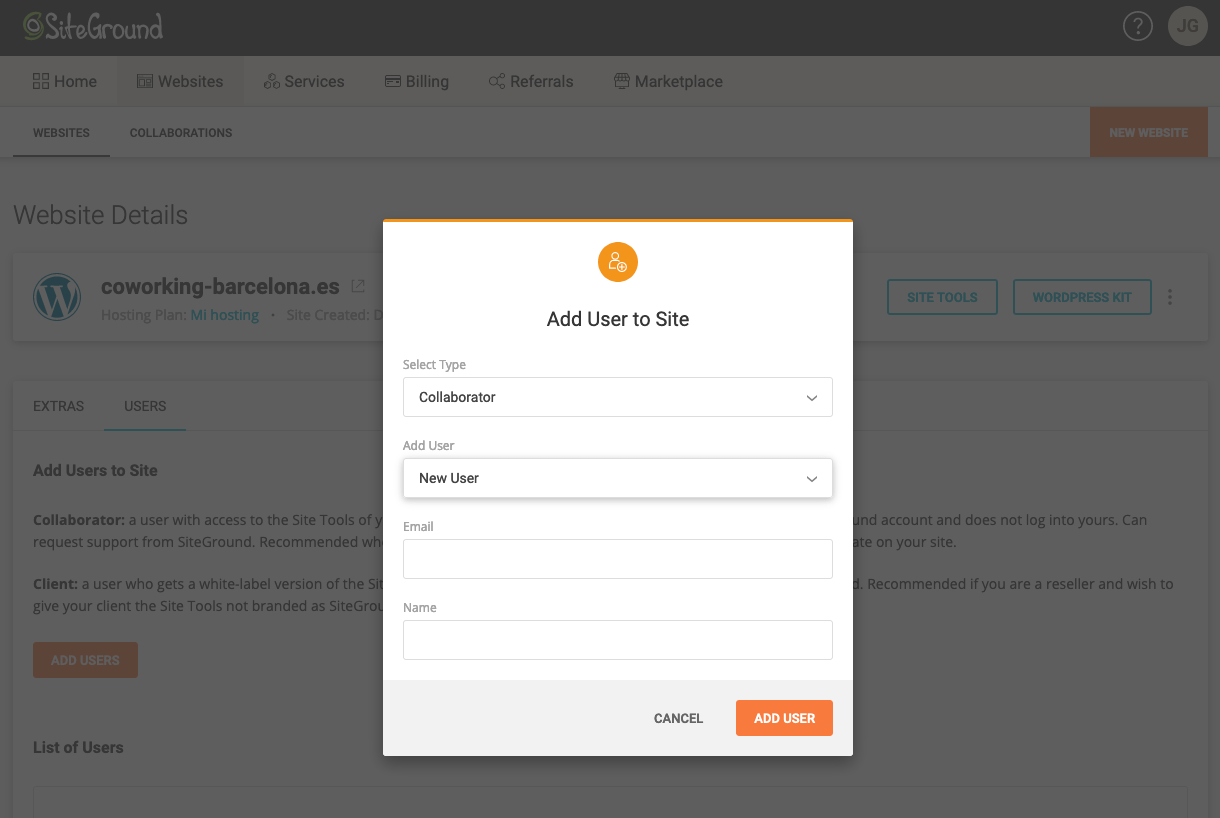
On top of that, it’s possible to add users to your admin panel and assign them to individual sites and roles. As you can imagine, this is a game-changer for big teams and agencies as they will be able to give access to clients.
SiteGround’s approach to Backups
Personally, I think that backups (alongside performance and a reliable customer support team) are one of the most crucial features of a hosting provider.
True, you can connect a 3rd party service that creates backups for you (e.g. UpdraftPlus for WordPress hosting), but I am of the opinion that having it integrated with your host is more efficient and easier to manage.
So I looked very closely at SiteGround’s backup system, and I have to say, it’s the best one I found for providers in this price range (e.g. WPEngine is better, but also way pricier).
Here is what I liked about it:
- The backup feature is seamlessly integrated with SiteGround’s system. So no foreign system which could create conflicts needs to be used.
- Backups for each site are managed individually, which means that you can create a backup for just one of your sites instead of having to create backups for all your SiteGround hosted sites.
- Having the option to create on-demand backups is a dream for those pushing code or system and plugin updates. Before doing so, you can create a backup for your peace of mind.
- Backups are useless unless you have an easy and effective way to restore them. SiteGround only requires a couple of clicks.
- And finally, the on-demand and restore backup options are included in the GrowBig and GoGeek plans at no extra cost – other web hosting companies charge for similar (worse) features.
There are a couple of things I’d like to be a bit different, for example, there’s a quota limit of 5 manual backups per site (you’ll have to delete an old one if the limit was reached), and there’s no way to download your backups, you can only restore them.
Please, be aware that the advanced backup capabilities (create on-demand and restoring) are only available with the GrowBig and GoGeek plans. With the entry-level plan, you will have 30-day backups, but you’ll need to contact the customer support team to restore them, no on-demand backup.
Testing SiteGround's web hosting
Uptime tests
I used StatusCake to measure the availability (uptime) of SiteGround’s servers. The fewer the interruptions the better. It’s recommended to have uptime figures above 99.95%.
SiteGround’s uptime results in our web host reliability tests, are impressive, as you can see in the chart below:
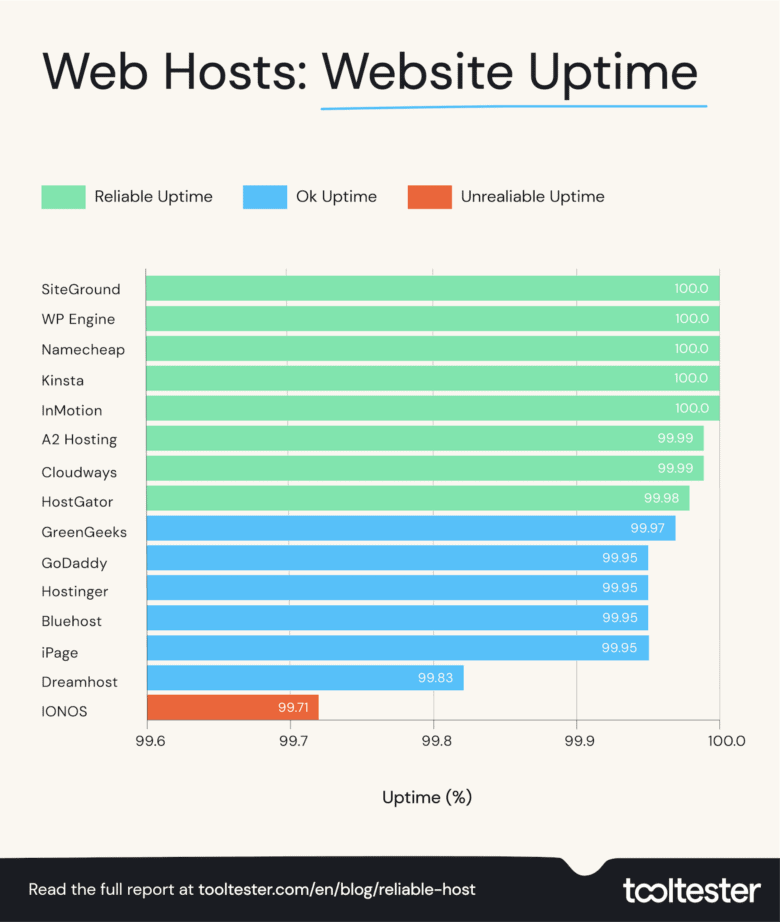
Only Kinsta have beaten them for uptime over the last 3 years:
| 2020 | 2021 | 2022 | |
|---|---|---|---|
| Uptime % | |||
| SiteGround | 99.97 | 100 | 100 |
| WP Engine | 99.99 | 99.99 | 100 |
| Namecheap | – | 100 | 100 |
| Kinsta | 100 | 100 | 100 |
| InMotion | 99.73 | 99.95 | 100 |
| A2 Hosting | 99.99 | 99.98 | 99.99 |
| Cloudways | 100 | 100 | 99.99 |
| HostGator | 99.91 | 99.99 | 99.98 |
| GreenGeeks | 99.98 | 99.98 | 99.97 |
| GoDaddy | 99.90 | 99.96 | 99.95 |
| Hostinger | 99.48 | 99.92 | 99.95 |
| Bluehost | 99.96 | 99.99 | 99.95 |
| iPage | 98.45 | 99.85 | 99.95 |
| Dreamhost | 99.99 | 99.96 | 99.83 |
| IONOS | – | 99.93 | 99.71 |
To monitor uptime I use StatusCake, a tool that checks each website every 5 minutes.
And this hosting provider refunds you part of your money if your availability falls below 99.9%. If availability is one of your concerns, SiteGround is a hosting provider you can count on.
Is SiteGround fast?
In my experience, SiteGround is without a doubt one of the fastest and most consistent web hosts. When we compare it to other web hosts in our most recent tests, its loading time is pretty impressive:
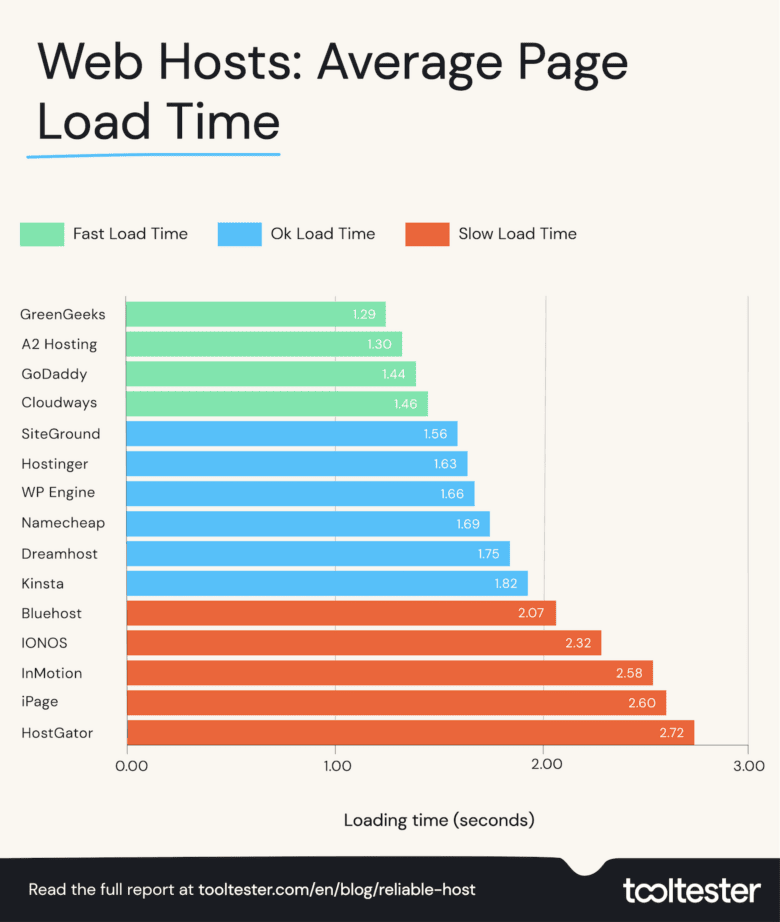
And SiteGround has consistently performed well in our web host speed tests, for the last three years:
| 2020 | 2021 | 2022 | |
|---|---|---|---|
| Page Load Time in Seconds | |||
| GreenGeeks | 2.39 | 1.56 | 1.29 |
| A2 Hosting | 3.15 | 2.01 | 1.30 |
| GoDaddy | 3.40 | 1.94 | 1.44 |
| Cloudways | 2.32 | 1.73 | 1.46 |
| SiteGround | 2.14 | 1.54 | 1.56 |
| Hostinger | 4.19 | 1.61 | 1.63 |
| WP Engine | 2.21 | 1.65 | 1.66 |
| Namecheap | – | 1.60 | 1.69 |
| Dreamhost | 3.28 | 1.84 | 1.75 |
| Kinsta | 2.98 | 1.77 | 1.82 |
| Bluehost | 3.07 | 2.87 | 2.07 |
| IONOS | – | 1.95 | 2.32 |
| InMotion | 4.36 | 2.75 | 2.58 |
| iPage | 4.19 | 2.76 | 2.60 |
| HostGator | 3.77 | 2.78 | 2.72 |
Results in seconds
As you can see, SiteGround have always had top results. This is great, as our own research consistently shows the importance of website speed for SEO, UX and conversions!
SiteGround’s WordPress Hosting optimization plugin
SiteGround has a plugin for optimizing websites for WordPress, that makes it easy for WordPress users to optimize websites. It’s amazing – it does the work of 3 or 4 plugins. On top of managing your website’s cache options, this SiteGround WordPress hosting also gives you options for:
- Compressing HTML, CSS, JavaScript and images
- Lazy loading images
- Combination of CSS files
- Optimization of browser cache
- GZIP Compression
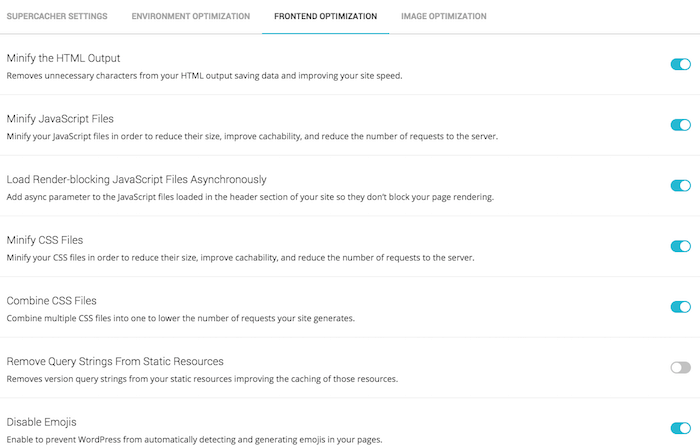
WordPress speed optimization SiteGround plugin
The results are exceptional. That’s why I think that SiteGround is one of the quickest web hosting services I have ever tried. If you need high-speed WordPress hosting for your project, I’d really recommend it.
SiteGround tutorial on how to install WordPress
Check out the following video-tutorial to see how to install WordPress with SiteGround:
CDN tests
Even though SiteGround now has its own CDN, I’d still say that one of SiteGround blessings is, that it has CloudFlare’s CDN pre-integrated. Cloudflare is one of the most popular services, and they offer a completely free account. I have to say that the free plan has some limitations, but it can still significantly improve your loading speed.
I tested how a single webpage loads with the enabled CDN and without it. The test website is on a server in England, and I wanted to check how it loaded from a geographical point further away. For this, we decided to perform loading tests from Dallas. We used the free Pingdom tool.

Test without CDN
We can see that even without the CDN, we get acceptable results. The total loading time was 3.20 seconds, we loaded 1.2 Mb and it received a score of 80 out of 100.
Here are the results with the CDN enabled:

Test with CDN
Repeating the test with Cloudflare’s CDN activated (in its free version), we see how loading time improves by nearly half a second. The size of the page is the same and our final loading score is better by 12 points.
So, if you’re going to use SiteGround for your website, it may prove very useful for you to activate Cloudflare’s CDN. Even the free version would help improve your website’s performance.
SiteGround Review: Final reflections
I was drawn to how SiteGround speaks about their own customer support team, their promises, availability and speed.
But do they meet expectations?
After years of trying them out, I think they offer a very good service. They have really fast loading speeds for shared hosting. The SiteGround support team is fast, effective and friendly, they are meant to be industry experts – many competitors fail here. Plus, if you’re looking for the best technology, SiteGround offers much more than average (e.g. Git or Staging environment).
Of course, this web hosting service is in the medium-to-high price range, and it would not be ideal for small-budget projects. Its advanced backup features are fantastic, but they aren’t available in the lowest plan for free. Also, be aware that each plan limits the sites that you are allowed to host.
I hope you found this SiteGround review helpful. But please, leave a comment below if you have any questions or comments.
> You can take a 30-day, no obligation trial of SiteGround. Or check out our round up of the best web hosting providers next!
Frequently Asked Questions
Sure, SiteGround is a big player in the WordPress community (they are recommended by WordPress themselves), and their decent price-quality ratio even secures them a place in our affordable managed WordPress hosting guide.
But what I love about the SiteGround + WordPress combination are all the extra WordPress hosting features they have. Let me name my favorites:
- An amazing speed optimization plugin for WordPress that allows you to configure your caching options, automatically optimize image size, lazy load images or minify your source code, among others.
- SiteGround has a starter plugin that will guide you whilst setting up your WordPress website. I personally don’t use it but it can be a nice bonus for beginners.
- SiteGround has a flexible system for WordPress and plugin updates that you can rely on. For example, you can decide that plugins are updated as soon as a new version comes out or you can leave it as a manual process (you do it).
- Advanced WordPress tools that make my life easier. For example, having the option of creating staging areas (copies of my site I can experiment with) has saved me from pushing wrong coding updates onto my live website.
- A migration plugin to easily move your WordPress site when you bring your site to SiteGround for the first time.
SiteGround is a better option than Bluehost because of its better performance (uptime and speed), friendly customer support, more advanced (free) backup options, pricing transparency and the different available data centers (servers) in 4 continents: USA, Europe, Australia and Asia.
Bluehost’s shared plans offer more storage, and prices can be a (tiny small bit) cheaper, assuming you don’t need a 3rd party provider for the missing Bluehost features (e.g. advanced backups).
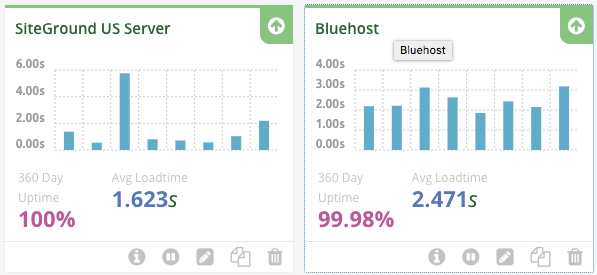
So generally speaking, I think SiteGround is a more rounded service. For more information check out my detailed comparison of these two hosting powerhouses.
Yes, Siteground has a free built-in Content Delivery Network. It’s straightforward to activate and includes 10GB of bandwidth. If you need more than that, you can either switch to Premium (at $14.99) or use Cloudflare instead.
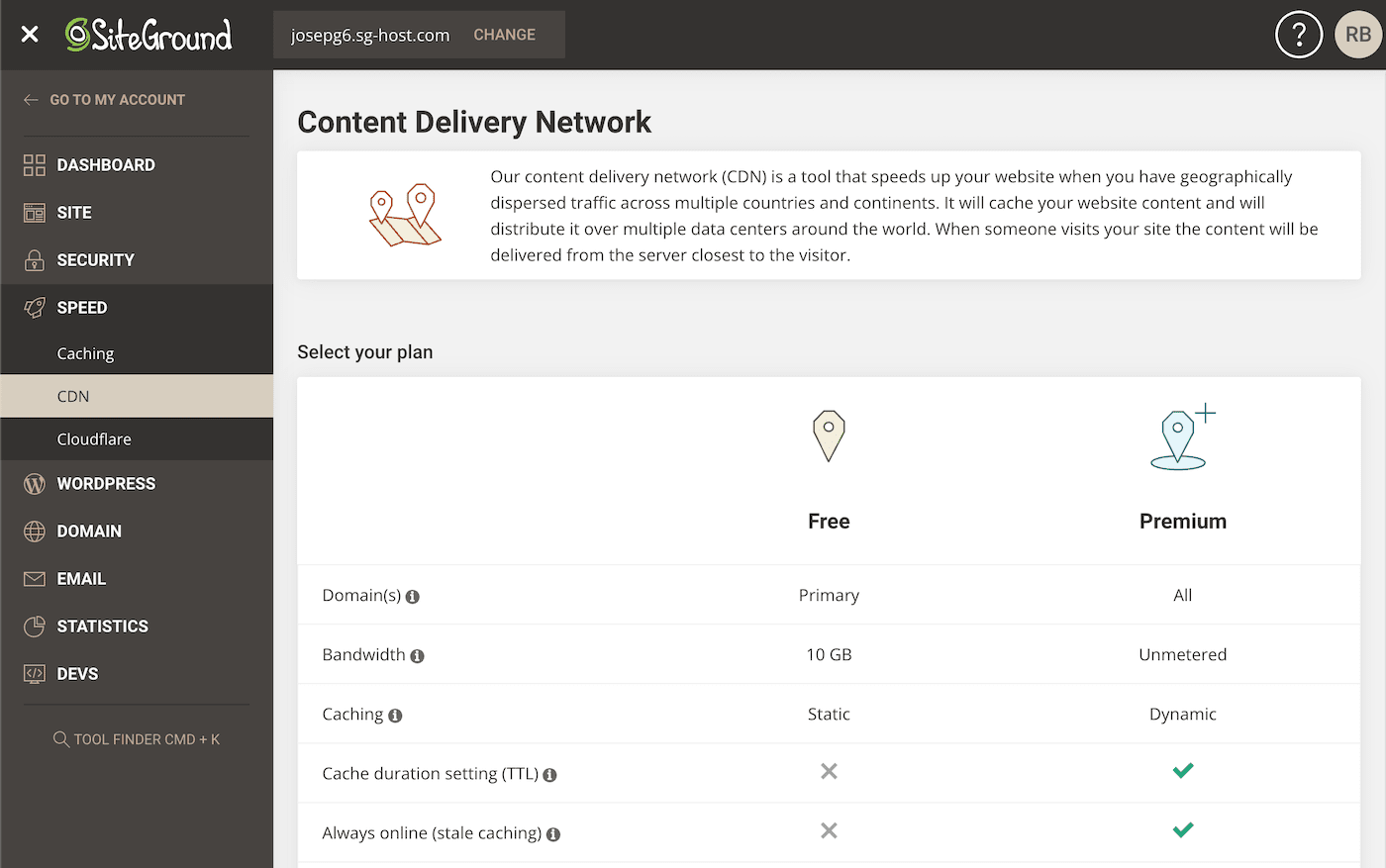
SiteGround makes it easy to integrate Cloudflare from their Site Tools (in the dashboard) – only a couple of clicks needed. Cloudflare has a free plan for their CDN (and other features), but if you need more robust / premium features, you’ll have to purchase a paid plan (Cloudflare starts at $20/month).
For most of our own sites at Tooltester, we typically use Cloudflare as it offers a big range of compression and minifying options as well as security features. Things a hosting provider’s own CDN (including SiteGround) usually doesn’t provide.
SiteGround has been working hard on expanding its hosting features so that your website loads faster. In fact, it normally comes out on top when we test and compare its performance against that of other web hosting companies.
Let me mention a couple of these tech features that are working behind the scenes:
- SiteGround uses Google Cloud hosting infrastructure for all its data centers, which, alongside Amazon’s AWS, is one of the top choices for performance. Google also claims to be environmentally friendly, using “50% less energy than the average data center”.
- SiteGround Optimizer is a WordPress plugin that, besides letting you control your site’s caching options, also offers a bunch of optimizations on the fly. Amongst others, it compresses and lazy-loads your images, optimizes your site’s code (e.g. JS, HTML and CSS minification and optimal loading), and combines Google font’s files.
- It has also developed a version of PHP Ultrafast that seems to use less resources (e.g. RAM and server resources), and should improve the loading time of your website. This feature is only available for GoGeek and SiteGround’s Cloud hosting plans.
- In 2020, SiteGround implemented a new compression algorithm developed by Google (named Brotli) that’s meant to be more efficient than the standard gzip. Because the compression is more efficient, your site should notice a loading speed increase.
In 2021 SiteGround launched a plugin to make WordPress sites more secure. For now, it’s a basic version, but it comes with interesting features like 2-factor authentication for WordPress (I can’t believe this is not a core feature of WordPress yet), and the possibility to limit the number of login attempts.
This plugin also provides some protection against hackers gaining access to WordPress sites. For example, it allows you to hide the WordPress version your site runs on to avoid mass attacks, and prevents scripts from being executed in your system folder, so hackers can’t get access to a backdoor of your site.
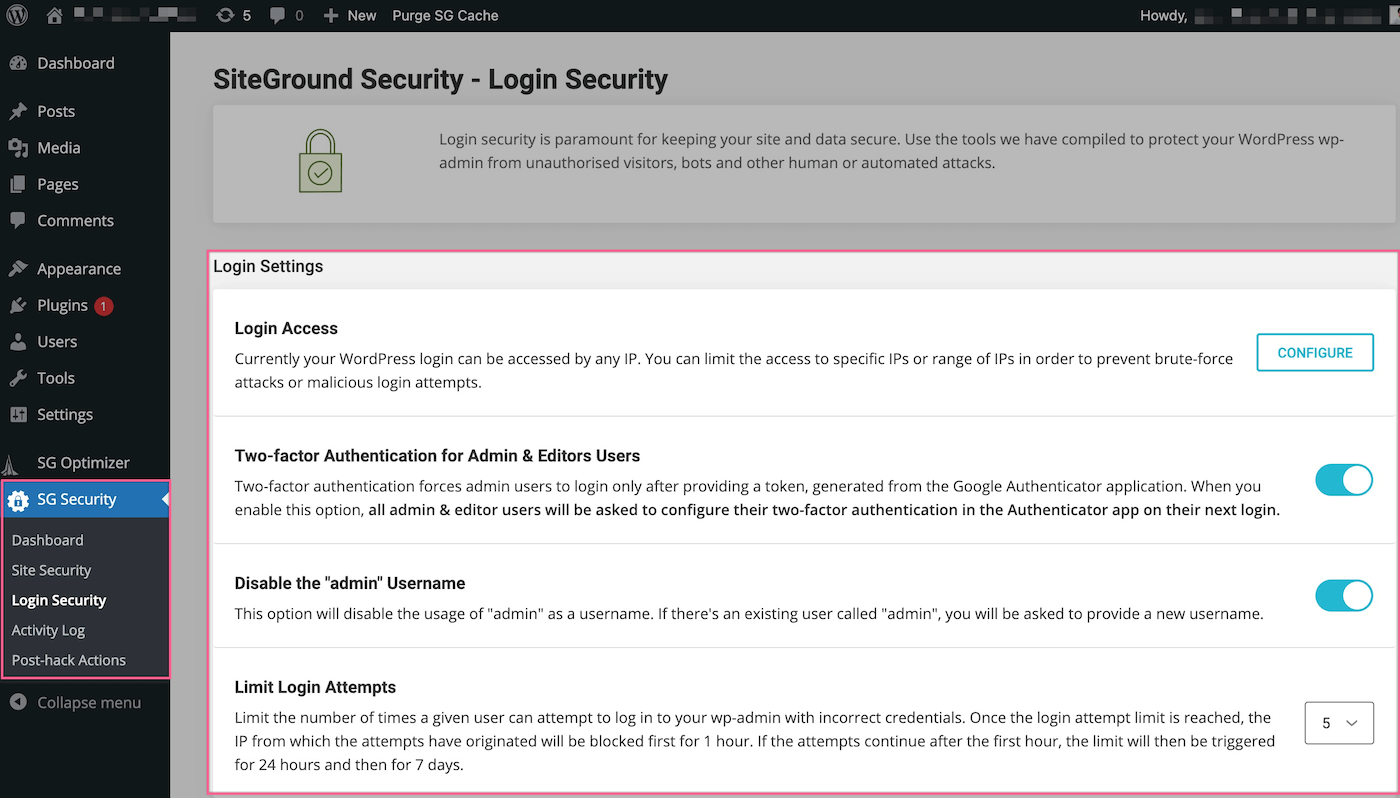
I must say that this plugin is not exclusive to SiteGround clients – any WordPress user is free to download and install it. However, I can imagine that it would work best when you are using SiteGround’s environment.
This plugin was recently created, so I haven’t had the time to geek around with it yet and find flaws. So, apart from needing more time, we’d also need the help of the WordPress community to really see how safe this plugin makes your WordPress site.
Good question!
SiteGround doesn’t include a free domain name in its plans. You’ll have to purchase one separately from them (around $16 a year for a .com domain) or buy one from a third-party provider that hopefully is a bit cheaper (e.g. Namecheap).
However, their hosting plans come with email accounts, so you’ll be able to use a professional-looking email like [email protected]. This option is available even if you register the domains with a third-party provider like Namecheap, provided you connect the domain properly to your SiteGround server.
SiteGround uses Google Cloud’s infrastructure; therefore, they use Google’s servers. Along with AWS (Amazon), Google Cloud servers are among the most popular cloud solutions – other top web hosts like WP Engine and Kinsta also use this service.

SiteGround Alternatives
We keep our content up to date
14/12/2022 - Badge added
01/06/2022 – Free SiteGround CDN now included
28/02/2022 – General update
17/01/2022 – SiteGround Review update and fact-check
14/01/2022 – SiteGround shared hosting and cloud hosting update
30/08/2021 – General & performance update
05/07/2021 – New WordPress security plugin
31/05/2021 – SiteGround new summer prices for started plans
19/05/2021 – SiteGround unlimited sites with GoGeek and GrowBig
14/04/2021 – SiteGround sites allowance changed
02/03/2021 – Dynamic caching and Ultrafast PHP update
17/01/2021 – Speed and optimization information added
20/10/2020 – Inodes limitation added
06/10/2020 – General update & performance
16/09/2020 – Ultrafast PHP added
19/06/2020 – No more free professional migrations
16/06/2020 – General price increase
12/05/2020 – GoGeek plans come with 40 GB of storage
04/05/2020 – New server locations in Australia and Germany
23/03/2020 – Free SSL certificates addition
27/01/2020 – Backup options and new dashboard
23/01/2020 – WordPress and new features, domain names
20/01/2020 – New server locations
01/10/2019 – New dashboard (SiteGround Site Tools)
01/04/2019 – New features for each plan
01/03/2019 – First Review
THE BEHIND THE SCENES OF THIS REVIEW
This article has been written and researched following a precise methodology.
Our methodology



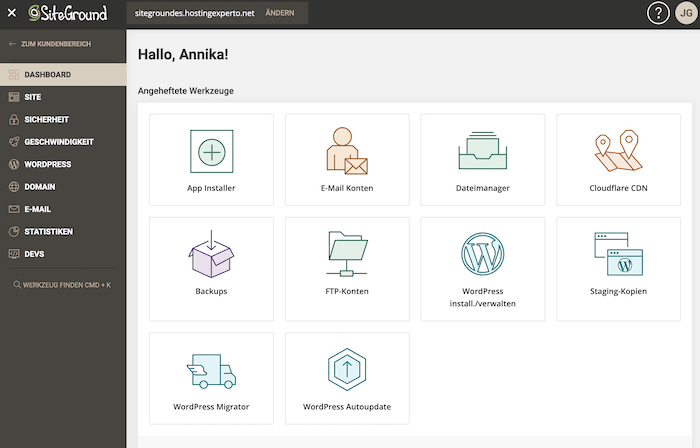
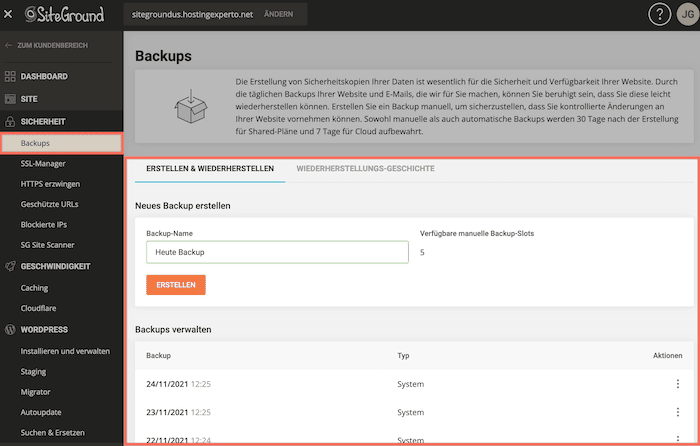
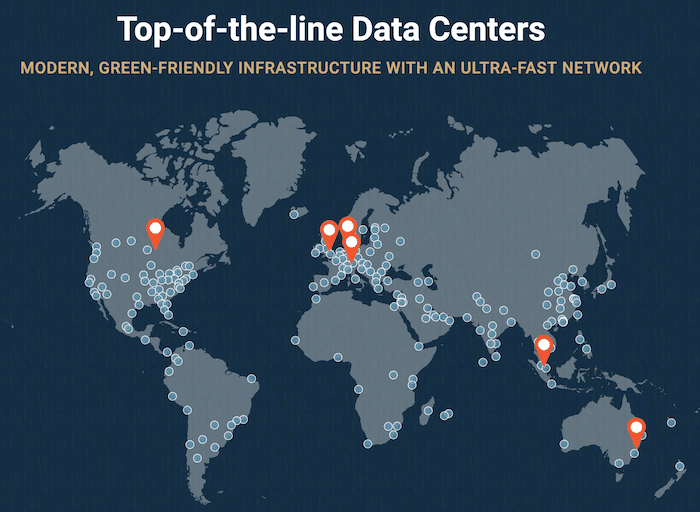
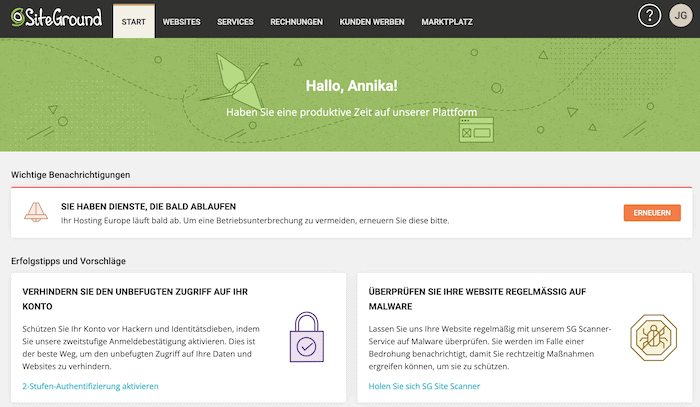

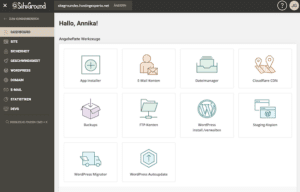
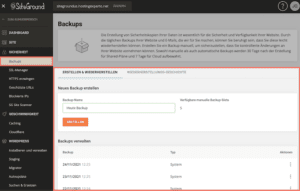




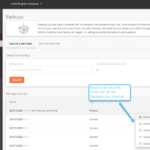



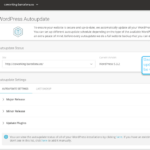





Comments